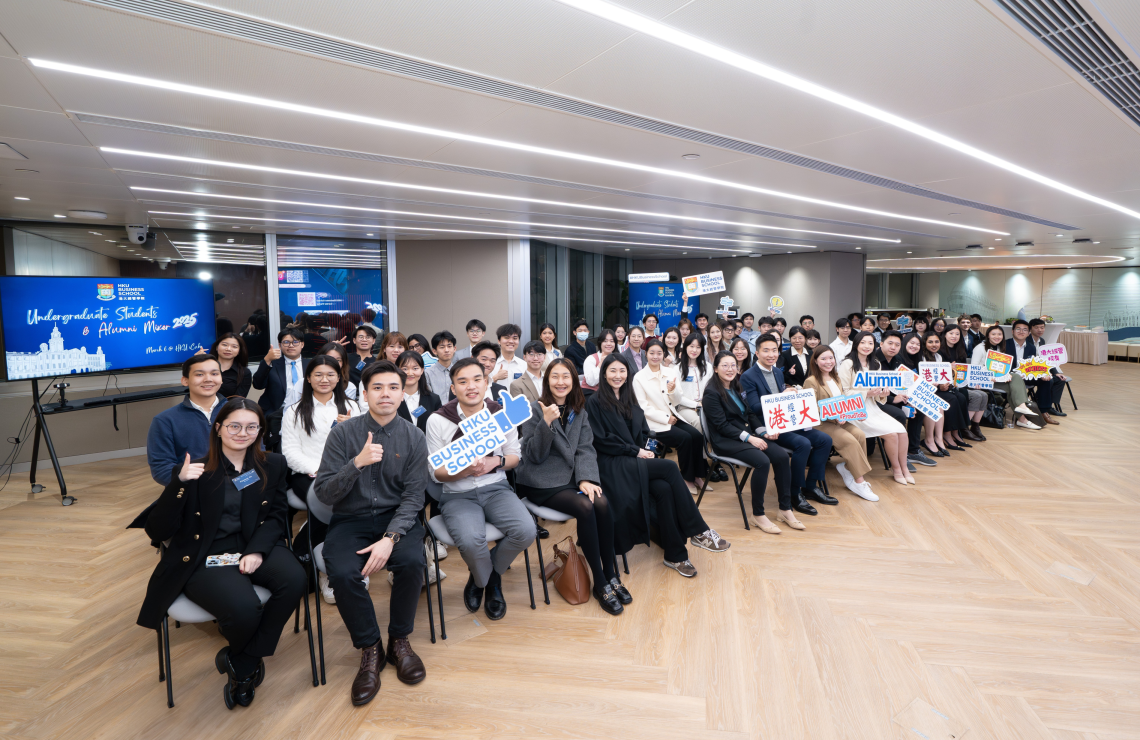To Sip Happiness from the Brew of Foreign Exchange Rates: Dr. Thomas Andreas MAURER
Hasta La Vista Family Business
Prior to the father of Dr. Maurer becomes an entrepreneur, he was the successor of his family business. Instead of taking joy of becoming the torchbearer, working and arguing with his own kin were miserable to him. Therefore, he admonished his children that they should pursue their own interests instead of following his footsteps.
Pursuing the interests he did, Dr. Maurer had taken major in Economics and furthered his economic studies by enrolling in a master's programme. Propelled by flying colors on his scorecard and strong business acumen, Dr. Maurer was awarded an equity research internship with a renowned titan in the banking sector. Although conducting equity research in private banking is a dream to many business students, Dr. Maurer found it not his cup of tea.
While most practitioners in the industry are only keen to know how financial models and equations could assist them in trading, Dr. Maurer is interested in understanding the inner workings behind different models and equations. To gain new knowledge by exploring the unknown, and to prove hypothesis through scientific corollaries and nuance logical deduction is what Dr. Maurer find financial studies interesting. Eventually, Dr. Maurer took a PhD in finance and became a scholar.
Pedagogy as a noble pursuit
In the natal years of Dr. Maurer’s academic career, he only treated teaching as an obligation. But subtle changes soon occurred and Dr. Maurer began to develop interests to connect with his students. During his teaching career in the US, Dr. Maurer reminisced that classes were small. One professor only has to lecture around 40 students. Capitalizing the advantage of a small class-size, Dr. Maurer took the initiative to discuss with students on their studies and career choices. Dr. Maurer felt privileged to be a teacher, as clearing the fog shrouding students’ future with his experience and knowledge, and subsequently receiving their gratitude, is a very rewarding achievement.
PhD is not the best path to investment banks
While Dr. Maurer welcomes students to join academia, he stresses that one must be passionate towards knowledge creation and must have great endurance. Creating new knowledge out of the blue is no easy task. While most enjoy the process of brainstorming new ideas, it could be boring to keep reading literature and thinking on the same problem for weeks, for months, and for years. Errors will also keep popping out, forcing researchers to redevelop their models over and over again. But Dr. Maurer believes that one could still seek joy from the ordeal. To discover special patterns and share your findings with other like-minded individuals in seminars and conferences, are what Dr. Maurer describes as “small happiness” in research.
Although taking a PhD could help you to land a job in the back office of an investment bank, Dr. Maurer considers this strategy an uneconomic one. PhD is not only difficult to accomplish, but it also takes 4-6 years from you. One would have been promoted several times during this interval already. In addition, research skills developed in PhD is not entirely compatible with the private sector. While the academia offers scholars unlimited research time and full discretion on topics selection, financial institutions do not offer you such luxury. It will be difficult for one to adapt to transfer from academia to the private sector.
Foreign exchange research
Over the years, Dr. Maurer has developed a great interest in researching on foreign exchange rates. His latest research focuses on what risks do investors face in the foreign exchange market and how they would mitigate and hedge these risks. Dr. Maurer points out that while there are a lot of existing financial models capable of explaining different economic forces, they are usually terrible at analyzing the economic forces behind the risks in the foreign exchange market. In order to solve this conundrum, Dr. Maurer adopts a two-pronged approach.
From a theoretical point of view, Dr. Maurer investigates how different investors from different countries price different risks by investing in different assets, and how their actions are related to exchange rates. On the other hand, Dr. Maurer will analyse this phenomenon empirically in order to investigate the optimal combination of different risks which generates the highest possible average return. In addition, Dr. Maurer will also investigate the risk compensation each risk in the foreign exchange market earns. Dr. Maurer believes that this research is useful to currency traders, high net worth individuals and international corporations’ which aims to hedge risks and even central banks around the world.
Using the Hong Kong Monetary Authority (HKMA) as an example, it is tasked to maintain the fixed exchange rate between the Hong Kong dollar and the US dollar. However, as the stability of the link is constantly under-challenged caused by local and US economic shocks, the HKMA has to buy or sell US dollars regularly in order to stabilise the exchange rate. Therefore, it is important to understand these risks and to know how expensive monetary interventions could get.
The time discount rate of US soldiers’ pension
In addition to his research on foreign exchange rates, Dr. Maurer is also researching on time discount rates by using data from the US military. The model aims to analyse how the changes in time discount rates affect asset pricing and the equilibrium model.
In the US military, soldiers are given a choice to either use a normal pension plan, or to get a cash pay-off immediately from their future pensions. This data enables Dr. Maurer to estimate the implied time discount rates for these soldiers and based on these results, Dr. Maurer discovers that there is a huge time variation in the discount rates among different service members. After further research, Dr. Maurer discovers that changes in local macroeconomic, especially in the changes of the property price, have a significant impact on the time discount rates on US soldiers.
In the US, if the value of your property appreciates, house owners could make their house a collateral and borrow more money from the bank, encouraging an increase in consumption expenditure. On the other hand, an appreciation in property value makes one feels wealthy, which may encourage additional consumption expenditures. After the US housing market crashed in 2007-2009, the country has been in need of efficient property policy. It is vital to understand whether relaxing borrowing constraints or asset purchasing programs are more effective to stimulate the economy. More recently one may wonder whether cash handouts by the HK government to citizens are an efficient policy to revive the local economy.
Are fintech firms deceiving investors?
Ever since the fintech trend has taken off, there have been concerns that fintech firms are deceiving investors by producing unnecessarily sophisticated and expensive technologies to solve simple tasks that could be handled by cheaper alternatives. Dr. Maurer had once heard of a story, where a firm had added the word Blockchain in its company name whilst none of its business is involved in Blockchain. The stock price of that company raised greatly immediately after the rename but it plunged after it was debunked.
While these kinds of fiascos are unpreventable, Dr. Maurer remains positive that the development of fintech does inject new impetus into the market. For example, the emergence of crowdfunding platforms has enabled a lot of micro start-ups who were rejected by traditional financial institutions to acquire capital. Crowdfunding platforms are also very useful in pushing social agendas. For example, in October 2019, YouTuber MrBeast and Mark Rober had started an initiative called TeamTrees, which aimed to raise USD 20 million to plant 20 million trees. The project received overwhelmingly positive feedback on the internet and its advertisements were featured in over 8000 YouTube videos by December 2019. The movement had also drawn the attention from big investors such as Elon Musk, who donated USD 1 million (and changed his Twitter account name into Treelon afterward), and the CEO of Shopify Tobias Lütke, who donated USD 1 million and 1 dollar. The project had met its goal in December 2019.
Machine Learning, on the other hand, is also a game-changer in the financial sector. Compare with traditional formulas and programmers, an AI could process large amounts of unprocessed data to calculate and predict different growth patterns. While the data produced by AI are highly accurate, Dr. Maurer also thinks that its major problem lies in its opaque operation pattern. AI operates in a black box. It presents the results to users without conveying how the result is produced. While financial institutions may not be keen on truth-seeking, it more or less implies that AI will not be beneficial to fields other than finance, such as in the fields of policymaking. When fathoming policies or predicting the impact of a certain policy, policymakers would have a strong incentive to understand what role do different factor play and how to do different factors impact one another. This matters to policymakers as the government serves as a platform to bridge and balance the interests of different stakeholders. Simply focusing on the end results without analyzing the impacts could yield catastrophic results.
Way forward
Joining HKU, Dr. Maurer hopes that he can create a positive impact on students’ personal development. Teaching in HKU for one semester, Dr. Maurer observes that students are relatively shy compare with the West. Dr. Maurer understands it is difficult to speak publicly as he himself takes years of practice to overcome this challenge. While he is keen to hang out with students, Dr. Maurer believes that the class size in Hong Kong might be too overwhelming to pull it off.
Inspired by the dean’s ambition to make the business school one of the best in the world, Dr. Maurer is aspired to form an international foreign exchange rates, expert group, by leveraging the reputation and connection of HKU.







